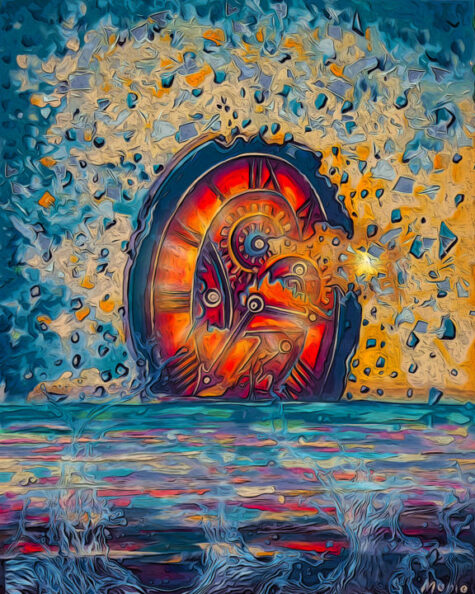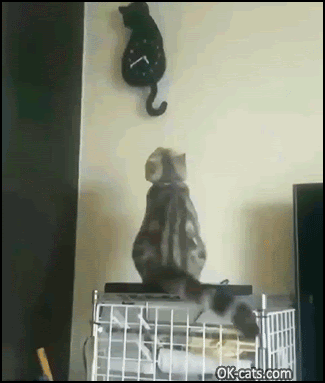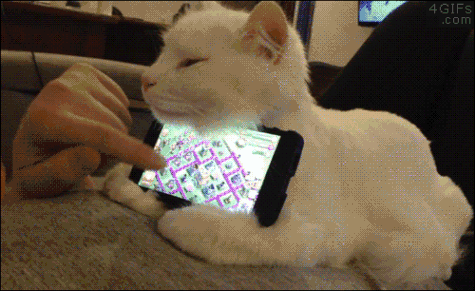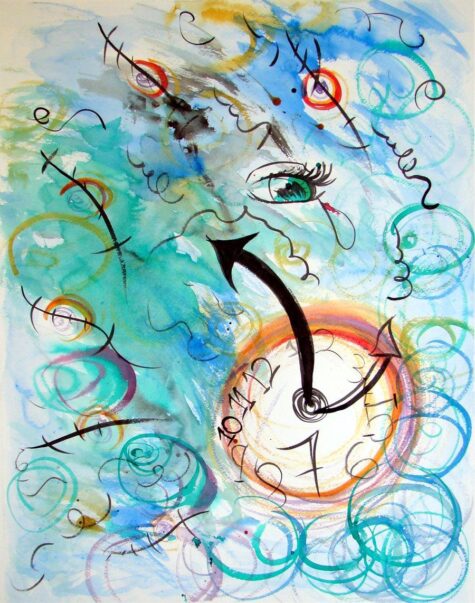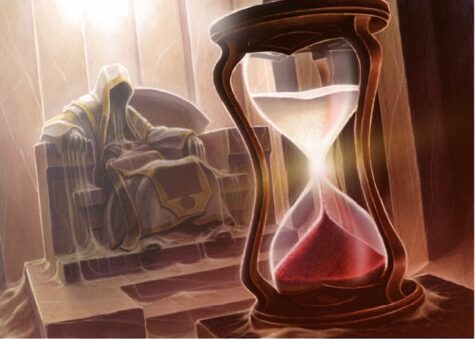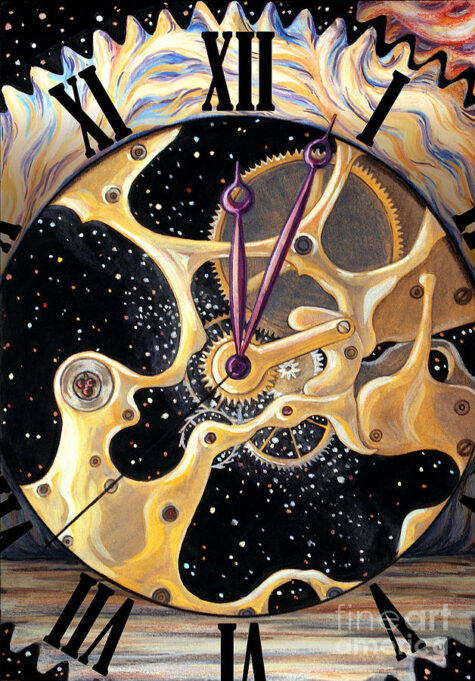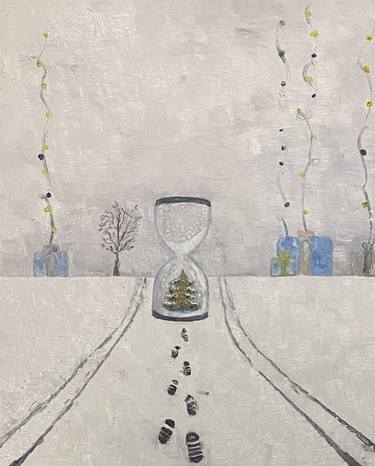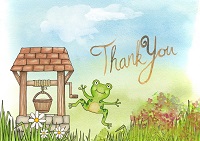Monthly Archives: January 2022
A New Day
Exploring Altschmerz
Today I thought we could explore Altschmerz. Altschmerz is a compound noun made from the words alt (old) and Schmerz (pain). It therefore translates to ‘old pain’. What does it mean?
Weariness with the same old issues that you’ve always had—the same boring flaws and anxieties you’ve been gnawing on for years, which leaves them soggy and tasteless and inert, with nothing interesting left to think about, nothing left to do but spit them out and wander off to the backyard, ready to dig up some fresher pain you might have buried long ago.
We’ve all done this. Some of us more than others. I am an expert in Altschmerz. What about you? How familiar are you with old pain? I’m sure we all experience this differently, for me, it generally takes the form of regret and self-recrimination. What about you?
We already know that What You Focus On Grows, so this can’t be a good place to spend our precious time.
Is there a solution?
If you search Google, you’ll find a plethora of “just do this, this, and this” articles mostly rehashing the same stuff over and over. Here are some of the better ones. Some of them focus on rumination, which is obsessive worrying and overthinking, which I think it fits in fairly well with Altschmerz.
- Establish a time limit!
If you find yourself in a funk, or in an obsessive worry, regret, or negativity loop, set a timer. Give yourself a set amount of time and really go for the gold. When the timer goes off. Get up. Wash your face. Get dressed. And do something completely different, change your environment, change the channel, change something.
I love this idea. I think I’m going to schedule some worry, guilt, anxiety, regret and general angst time. Make it a part of my daily routine. It will need to be sandwiched in between activities that require me to be functional and present, and/or my favorite fun distractions so that I can easily pull myself out if I get in too deep.
- Use it to make your life better.
Let’s imagine you received a considerable electricity bill a week ago. You paid the bill, but you suddenly start thinking about it, and you feel more and more upset and stressed. The first step to turn this into something meaningful is to notice what you’re doing. This can be as simple as, “I’ve just started having anxiety about the huge electricity bill.”
Identify the reasons why you’re worrying. For example, “I’m worrying over the electricity bill because I’m on a tight budget, I’m frustrated I have to spend so much money at once, and I’m disappointed because I should have been more careful about using electricity.”
Choose some meaningful changes you could make in your life. You might decide to take shorter showers and wear extra layers of clothing, rather than always turning on the heater. You might open the blinds earlier to make the most of the natural light, rather than turning artificial lights on. All of these changes can help reduce your electricity bill next time.
Take action. Once you have some action steps, do your best to follow through. Write down helpful reminders, set timers, find an accountability buddy — anything that will help you implement the meaningful changes you chose in the previous step.
By identifying helpful changes and implementing them into your life, you’ll train yourself to learn from past mistakes, rather than just “beating yourself up” about them.
- Practice mindfulness
Mindfulness is the practice of being present in the moment with an attitude of open-mindedness and curiosity.
For example, you might take a shower, and rather than thinking about the mistakes you’ve made over the last weeks, months, and years, you could practice mindfulness. You might feel the water falling onto your skin. When you close your eyes, you listen to the different sounds you can hear. You notice areas of warmth and coolness in your body. Whenever you catch your mind wandering to the past or future, you re-focus on the moment.
A study in 2019 found that participants who practiced mindfulness were less likely to experience depression. The study author said, “Ruminators tend to latch onto a negative emotion and repeatedly mull it over in their mind, whereas mindfulness teaches us not to become entangled with our negative emotions.”
Next time you notice yourself obsessing about old pain, try a mindfulness practice like mindful breathing or mindful listening.
- Cultivate your confidence.
Low self-esteem has been linked to increased rumination. When you regularly focus on the past and negative events, you might start to feel like you’re not good enough. You might see your mistakes more than your achievements. Rather than finding ways to learn and grow, you might become caught up in thoughts about what “should” have happened differently. Feelings of shame, disappointment, frustration, and unfairness might grow stronger. So it’s not a huge surprise that your self-esteem can take a hit.
However, if you focus on cultivating your confidence, you might reduce your tendency to focus on the negatives. At the end of each day, write down a list of things you’ve done well. Know and pay attention to your best qualities. Smile at yourself often. Before you leave the house in the mornings, tell yourself how awesome you are. Because you are awesome! This is actually true.
- Talk about your thoughts.
Sometimes, an effective way to release persistent or upsetting thoughts is to talk about them. Go out for coffee with a supportive friend or family member and tell them what’s been on your mind. Invite your fears or failures into the open, where they often become less distressing.
If you don’t feel comfortable talking about persistent or upsetting thoughts with the people close to you, perhaps you’d prefer talking a licensed mental health professional. And if that’s not an option, tell your dog, your cat, or even the moon. Sometimes speaking those thoughts aloud allows them to be released.
- Use distractions.
Interrupt persistent thoughts about the past by engaging in useful distractions. Listen to a playlist of your favorite uplifting songs. Call a friend and ask them about their day. Go for a run. Declutter and tidy your home. Do something creative, like mindful coloring, gardening, or playing music.
Try to avoid mindless distractions that don’t add value to your life, and find constructive distractions that boost your emotional, physical, or social wellbeing.
Time Lords
So far we’ve talked a lot about time, and how we might possibly be frittering it away even though we don’t have all that much of it. Serious stuff! So let’s finish up all this serious talk, with something fun!
It’s a Time Lord Name Generator. How fun is that?
My Time Lord Name is: The Poet AKA Dundrollbygotheneeldri
You are known as The Poet. Your original Gallifreyan name is Dundrollbygotheneeldri or Dundroll for short.
Back on Gallifrey, you led a dull and uninteresting life, working as a Deputy Assistant to the Assistant Deputy at the Prydon Academy – but now, you travel Time and Space in search of adventure!
Your Type 66 TARDIS is currently stuck in disguise as a Sherman tank, and your latest travelling companion is a gritty, cynical newspaper journalist from the 1990s, who discovers the universe is weirder and wilder than he ever expected.
I like it! The next time I start to worry about time and now there’s not enough of it, whenever I realize that I am wasting time, or allowing corporate America to steal my time… I’m going to remember that in some alternate reality, I have a Type 66 Tardis and my Time Lord Name is Dundroll… This is going to make me smile and then I will be able to let all that worry go and just enjoy the moment even if that moment is boring or uncomfortable.
If you are a Dr Who fan, you’ll totally get this, if not…
Here’s an explanation:
The Time Lords were first created in 1969 by writers Malcolm Hulke and Terrance Dicks, in ‘The War Games’, Patrick Troughton’s final story as the Second Doctor. The Doctor’s home planet was first named as Gallifrey in 1973 in the story ‘The Time Warrior’, written by Robert Holmes.
Since then, the mythos of Gallifrey has expanded in a massive number of ways thanks to stories like The Deadly Assassin, ‘The Invasion of Time’, ‘Arc of Infinity’ and ‘The Trial of a Time Lord’, and we’ve tried to use as much detail from the classic shows and from various spin-off novels as possible in creating the Time Lord names.
The Biology of the Time Lords
Time Lords are the elite of the planet Gallifrey in the constellation of Kasterbouros, and they are super-intelligent beings who can live for thousands of years (although not all Gallifreyans are Time Lords). They appear human, but have many physiological differences – Time Lords have two hearts, an internal temperature of only 15 degrees Centigrade, and a respiratory bypass system that protects them from suffocation and strangulation.
They also have the power of regeneration, meaning they can completely transform their appearance and personality twelve times, although certain Time Lords have found ways of extending their lives and even acquiring new regeneration cycles.
The History of the Time Lords
The Time Lords jealously guarded the secrets of Time Engineering that were bequeathed to them by the legendary pioneers Omega and Rassilon, and for thousands of years they have kept to a strict rule of non-interference with other races, only observing the outside universe and never getting involved.
Secretly, organizations such as the Celestial Intervention Agency have been regularly breaking this rule, most notably in their attempt to persuade the Doctor to commit genocide by wiping out the Daleks before they were created, long held to be the opening strike of the cataclysmic Time War.
Time Lord Society
Much of Time Lord society is aloof and stagnant – power lies with the High Council, ruled by the Lord President and the principle colleges, where it only matters whether you are a member of the Prydonian, Arcalian or Patrexe chapters.
Bureaucracy and order rule the day, while many secrets are hidden away in the computer system known as the Matrix, where the combined intelligences of generations of deceased Time Lords can create a whole virtual universe of dreams and nightmares.
Gallifrey is a frustrating, dull place to live – so it’s no wonder that you’ve finally had enough and are stealing a TARDIS so that you can escape and travel the universe!
About Time Lord Names
Our Doctor Who inspired generator will not only give you a new identity as a renegade Time Lord, but you’ll also get your full Gallifreyan name (and its shortened version), what you used to do before you escaped your home planet for a life of adventure, the current disguise of your stolen TARDIS, and a companion to travel with you!
So how about it? Are you going to check out the Time Lord Name Generator? If you do, I’d really love to know your Time Lord Name!
Time Thieves
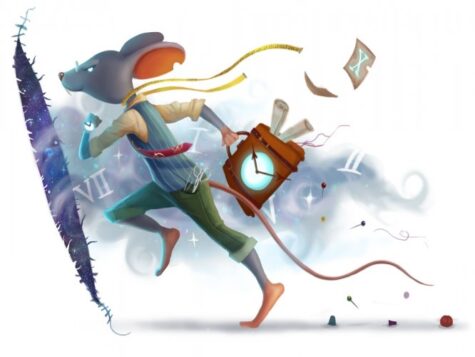 In our so-called ‘Age of Distraction’, it feels almost impossible to stop getting distracted. The world around us – and the usual suspects of our phones, emails, and other technologies – seem to be vying for our attention. And doing all in their power to stop us focusing.
In our so-called ‘Age of Distraction’, it feels almost impossible to stop getting distracted. The world around us – and the usual suspects of our phones, emails, and other technologies – seem to be vying for our attention. And doing all in their power to stop us focusing.
Just like a thief, time thieves are sneaky, secretive and take what is valuable to us without us knowing.
If we want to get our time, attention and energy back for the things we find important, we need to start by looking at our relationship with our phones. These are the biggest ‘Time Thieves’ around. Other Time Thieves might include one or more of the following:
- YouTube
- Social Media
- Television
- Video Games
For me, my phone with it’s various games, apps, and the ever present Facebook is the worst offender. This is closely followed by YouTube, google, and mindless television. What do your personal Time Thieves look like?
Making Time Thieves Work For Me
There are lots of articles all over the internet on how to deal with distractions, some are more useful than others. I’m not going to bore you with them here. Instead I’m going to talk about what has actually been working for me:
- Games On My Phone
There’s this silly little game on my phone called Township. I somehow got totally entangled in it to the point of ridiculousness. Then I had this brilliant idea that I couldn’t play it unless I was on my treadmill. Perfect! I haven’t missed a single day of exercise for 2 months.
- Mindless Television
At some point during the lockdown, I got hooked on Court TV… Really? Yes! I have no clue why I find it so interesting, but I really do enjoy watching the trials live. It has an added bonus of keeping me grounded in the here and now because it’s actual people, live in the moment. And what I’ve discovered is that it’s way easier for me to wash dishes, get the laundry put away, and do little household chores if I am also watching a trial unfold.
If Court TV doesn’t have anything going on that interests me, sometimes I can find other fun stuff like Storm Chasers, The Great British Baking Show, or documentary shows about natural disasters, plane crashes, ships that sank in a spectacular way. It takes the boredom out of the more tedious activities that nag at me to get done.
More recently, I’ve been using Facebook to help me get the Prosperity Project posts wrangled and uploaded. I made a deal with myself that I could stay off of Facebook all the way up to and until I get something finished and scheduled on the website.
When I had to go out to my car and scrape all the ice off the windshield and warm it up, I told myself that this would be a perfect time to scroll through Facebook. The whole ordeal of sitting in a cold car while it warmed up was made more palatable with the addition of checking out all the “new” stuff my “friends” were talking about.
- Arts and Crafts
It occurs to me that it’s possible that art is one of my favorite distractors. I don’t think it’s a Time Thief, but I do think that I use it to totally disappear from the here and now and slide into a whole other world. What’s great about it is that I can make a bunch of cool stuff to give away as gifts, or put online for sale as a way to make a little bit of extra cash. Plus it’s fun and rewarding, much better than scrolling through my news apps or sitting and staring at a stupid television show.
Knitting gives my hands something to do when I find myself snacking all night long. Munching on junk food isn’t necessarily a time thief, but it isn’t good for me either, and I find that knitting effectively interrupts my need to keep putting stuff in my mouth.
Now It’s Your Turn
What are your most familiar Time Thieves? When and where are you most bored and uncomfortable? How do you cope with it? What if you just sat with it and faced it? How can you use your personal Time Thieves to your advantage? What are your triggers? When are you most likely to let those Time Thieves in?
Getting Distracted
This is an edited extract from Four Thousand Weeks by Oliver Burkeman. It’s kind of long, and I did try to break it up into shorter, easier to read pieces. As you can see, I did not succeed. It’s a great article though, and well worth the time spent reading it. I’ve decorated it with some cute cat gifs because.. well… they’re distracting and fun which might help with the long read.
It hardly matters how committed you are to making the best use of your limited time if, day after day, your attention gets wrenched away by things you never intended to focus on.
Distraction truly matters – because your experience of being alive consists of nothing other than the sum of everything to which you pay attention. At the end of your life, looking back, whatever compelled your attention from moment to moment is simply what your life will have been. When you pay attention to something you don’t especially value, it’s not an exaggeration to say that you’re paying with your life.
This was why Seneca, in On The Shortness Of Life, came down so hard on his fellow Romans for pursuing political careers they didn’t really care about, holding elaborate banquets they didn’t especially enjoy, or just “baking their bodies in the sun”: they didn’t seem to realize that, in succumbing to such diversions, they were squandering the very stuff of existence.
Seneca risks sounding like an uptight pleasure-hater – what’s so bad about a bit of sunbathing? – and, to be honest, I suspect he probably was. But the crucial point isn’t that it’s wrong to choose to spend your time relaxing, whether at the beach or on BuzzFeed. It’s that the distracted person isn’t really choosing at all. Their attention has been commandeered by forces that don’t have their highest interests at heart.
All of which helps clarify what’s so alarming about the contemporary online “attention economy”, of which we’ve heard so much in recent years: it’s essentially a giant machine getting you to care about things you didn’t want to care about. And you have far too little control over your attention simply to decide, as if by fiat, that you’re not going to succumb to its temptations.
Social Media
Social media is engineered to constantly adapt to our interests. No wonder the rest of reality seems unable to compete.
Many of us are familiar with the basic contours of this situation. We know that the “free” social media platforms we use aren’t really free, because, as the saying goes, you’re not the customer but the product being sold. In other words, the technology companies’ profits come from seizing our attention, then selling it to advertisers.
You might also be aware that this is delivered by means of “persuasive design” – an umbrella term for an armory of psychological techniques borrowed directly from the designers of casino slot machines, for the express purpose of encouraging compulsive behavior.
One example among hundreds is the ubiquitous drag-down-to-refresh gesture, which keeps people scrolling by exploiting a phenomenon known as “variable rewards”: when you can’t predict whether or not refreshing the screen will bring new posts to read, the uncertainty makes you more likely to keep trying, again and again and again, just as you would on a slot machine.
What’s far less widely appreciated, though, is how deep the distraction goes, and how radically it undermines our efforts to spend our finite time as we’d like. As you surface from an hour inadvertently frittered away on Facebook, you’d be forgiven for assuming that the damage, in terms of wasted time, was limited to that single misspent hour.
But you’d be wrong. Because the attention economy is designed to prioritize whatever’s most compelling – instead of whatever’s most true, or most useful – it systematically distorts the picture of the world we carry in our heads at all times. It influences our sense of what matters, what kinds of threats we face, how venal our political opponents are – and all these distorted judgments then influence how we allocate our offline time as well.
If social media convinces you, for example, that violent crime is a far bigger problem in your city than it really is, you might find yourself walking the streets with unwarranted fear. If all you ever see of your ideological opponents online is their very worst behavior, you’re liable to assume that even family members who differ from you politically must be similarly, irredeemably bad, making relationships with them hard to maintain.
So it’s not simply that our devices distract us from more important matters. It’s that they change how we’re defining “important matters” in the first place. In the words of the philosopher Harry Frankfurt, they sabotage our capacity to “want what we want to want”.
I vividly recall walking alone along a windswept Scottish beach as dusk began to fall, when I experienced one particularly disturbing side-effect of persuasive design, which is the twitchiness you start to feel when the activity in which you’re engaged hasn’t been crafted by a team of professional psychologists hellbent on ensuring that your attention never wavers.
I love windswept Scottish beaches at dusk more passionately than anything I can ever remember encountering on social media. But only the latter is engineered to constantly adapt to my interests and push my psychological buttons, so as to keep my attention captive. No wonder the rest of reality sometimes seems unable to compete.
To make things more troublesome still, it can be difficult even to notice when your outlook on life is being changed in this depressing fashion, thanks to a special problem with attention, which is that it’s extremely difficult for it to monitor itself.
The only faculty you can use to see what’s happening to your attention is your attention, the very thing that’s already been commandeered. This means that once the attention economy has rendered you sufficiently distracted, or annoyed, or on edge, it becomes easy to assume that this is just what life these days feels like. In TS Eliot’s words, we are “distracted from distraction by distraction”.
The unsettling possibility is that if you’re convinced that none of this is a problem for you – that social media hasn’t turned you into an angrier, less empathic, more anxious or more numbed-out version of yourself – that might be because it has. Your finite time has been appropriated, without you realizing anything’s amiss.
As the technology critic Tristan Harris likes to say, each time you open a social media app, there are “a thousand people on the other side of the screen” paid to keep you there – and so it’s unrealistic to expect users to resist the assault on their time and attention by means of willpower alone.
Yet if we’re to understand distraction at the deepest level, we’ll also have to acknowledge an awkward truth at the bottom of all this, which is that “assault” – with its implications of an uninvited attack – isn’t quite the right word.
We mustn’t let Silicon Valley off the hook, but we should be honest: much of the time, we give in to distraction willingly. Something in us wants to be distracted, whether by our digital devices or anything else – to not spend our lives on what we thought we cared about the most. The calls are coming from inside the house.
Why Do We Want To Be Distracted?
Consider the archetypal case of being lured from your work by social media: it’s not usually that you’re sitting there, concentrating rapturously, when your attention is dragged away against your will. In truth, you’re eager for the slightest excuse to turn away from what you’re doing, in order to escape how disagreeable it feels to be doing it; you slide away to the Twitter pile-on or the celebrity gossip site with a feeling not of reluctance but of relief.
“One of the puzzling lessons I have learned,” observes the American author Gregg Krech, describing his own experience of that urge, “is that, more often than not, I do not feel like doing most of the things that need doing. I’m not just speaking about cleaning the toilet bowl or doing my tax returns. I’m referring to those things I genuinely desire to accomplish.”
It’s worth pausing to notice how exceptionally strange this is. Why, exactly, are we rendered so uncomfortable by concentrating on things that matter – the things we thought we wanted to do with our lives – that we’d rather flee into distractions, which, by definition, are what we don’t want to be doing with our lives? So that suddenly, the thing you’d resolved to do feels so staggeringly tedious that you can’t bear to focus on it for one moment more.
The solution to this mystery, dramatic though it might sound, is that whenever we succumb to distraction, we’re attempting to flee a painful encounter with our finitude – with the human predicament of having limited time and, more especially in the case of distraction, limited control over that time. When you try to focus on something you deem important, you’re forced to face your limits, an experience that feels especially uncomfortable precisely because the task at hand is one you value so much.
This is also why boredom can feel so surprisingly, aggressively unpleasant: we tend to think of it as not being interested in whatever it is we’re doing, but, in fact, it’s an intense reaction to the deeply uncomfortable experience of confronting your limited control.
Boredom can strike in widely differing contexts: when you’re working on a major project; when you can’t think of anything to do on a Sunday afternoon; when it’s your job to care for a two-year-old for five hours straight. But they all have one characteristic in common: they demand that you face your finitude. You’re obliged to deal with how your experience is unfolding in this moment, to resign yourself to the reality that this is it.
No wonder we seek out distractions online, where it feels as though no limits apply – where you can update yourself instantaneously on events taking place a continent away, present yourself however you like, and keep scrolling forever through infinite news feeds, drifting through “a realm in which space doesn’t matter and time spreads out into an endless present”, to quote the critic James Duesterberg.
This also makes it easier to see why the strategies generally recommended for defeating distraction – digital detoxes, personal rules about when you’ll allow yourself to check your inbox, and so forth – rarely work, or at least not for long. They limit your access to the things you use to assuage your urge towards distraction, but they don’t address the urge itself.
Even if you quit Facebook, or ban yourself from social media during the workday, or exile yourself to a cabin in the mountains, you’ll probably still find it unpleasantly constraining to focus on what matters, so you’ll find some way to relieve the pain by distracting yourself: by daydreaming, taking an unnecessary nap, or – the preferred option of the productivity geek – redesigning your to-do list and reorganizing your desk.
What we think of as distractions aren’t the cause of our being distracted. They’re just the places we go to seek relief.
The overarching point is that what we think of as distractions aren’t the ultimate cause of our being distracted. They’re just the places we go to seek relief from the discomfort of confronting limitation. The reason it’s hard to focus on a conversation with your spouse isn’t that you’re surreptitiously checking your phone beneath the dinner table.
On the contrary, “surreptitiously checking your phone beneath the dinner table” is what you do because it’s hard to focus on the conversation – because listening takes effort and patience and a spirit of surrender, and because what you hear might upset you.
Even if you place your phone out of reach, therefore, you shouldn’t be surprised to find yourself seeking some other way to avoid paying attention. In the case of conversation, this generally takes the form of mentally rehearsing what you’re going to say next, as soon as the other person has finished making sounds with their mouth.
So What Can We Do About It?
I wish I could reveal, at this point, the secret for uprooting the urge towards distraction – the way to have it not feel unpleasant to decide to hold your attention, for a sustained time, on something you value, or a task you can’t easily choose not to do. But the truth is that I don’t think there is one.
The most effective way to sap distraction of its power is to stop expecting things to be otherwise – to accept that this unpleasantness is simply what it feels like to commit ourselves to the kinds of demanding and valuable tasks that force us to confront our limited control over how our lives unfold.
And yet there’s a sense in which accepting this lack of any solution is the solution. The way to find peaceful absorption in a difficult project, or a boring Sunday afternoon, isn’t to chase feelings of peace or absorption, but to acknowledge the inevitability of discomfort, and to turn more of your attention to the reality of your situation than to railing against it.
Some Zen Buddhists hold that the entirety of human suffering can be boiled down to this effort to resist paying full attention to the way things are going, because we wish they were going differently (“This shouldn’t be happening!”), or because we wish we felt more in control of the process.
There is a very down-to-earth kind of liberation in grasping that there are certain truths about being a limited human from which you’ll never be liberated. You don’t get to dictate the course of events. And the paradoxical reward for accepting reality’s constraints is that they no longer feel so constraining.
Seeds For Thought
Yesterday I spent a little bit of time talking about time … this morning I’m floundering around unsure about where to take us next, so I’m going to share some of the thoughts I had during my morning meditation.
It occurred to me that time is like a seed, it starts out compressed and organized and then it explodes into something that cannot and will not ever be put back into that tight little package.
This is also a perfect example of how life might work. In the beginning, before we are born, maybe we are just an idea, a tight little package, neatly organized and full of possibilities. And then we get planted. And with the right conditions, just like a seed, our experience of life explodes just a little bit and a tiny root begins to extend out and down looking for nourishment and a home base. At the same time, we begin to extend up and out reaching for possibilities, the larger world. And there’s this huge drive to be more than we are right now, an irresistible push to expand and grow and be everything we can be.
So this brings up lots of interesting questions:
- Who has the original idea?
- Is there a larger me out there in the void of the unknown?
- Who really plants that little seed?
- Is there any way to look out past the known world and see the larger picture?
- Could I possibly be a random thought? Unfinished and unplanned?
If we take this metaphor a little further, we realize that it really does matter what family you were born into, and where, and when. For example, last year I planted an ambitious container garden. I went to the greenhouse and bought a bunch of flowers and herbs. I just got the ones I wanted without paying any attention to how big they would get, or what sort of sunlight and soil they might need to thrive.
Here’s what happened.
The mint grew like crazy! I don’t know who ate the carnations, but they were the first to go. Rabbits munched away on the impatiens but they managed to hold their own for quite a while, unlike the marigolds which surprised me by disappearing rather quickly. The lavender loved her spot, and did really well.
The coleus turned into a huge giant that totally overpowered the patchouli. He was really pretty, but he was also kind of a bully. Some of the scented geraniums did really well, others not so much. The rose bush was spectacular. The dahlia’s sprawled all over the place, made some really wonderful flowers, and then suddenly died.
I didn’t think the wildflower seeds I planted would ever grow, and when they finally did they were weak and spindly and only 2 zinnias and a handful of cosmos survived. My morning glories were beautiful, but they had a hard time figuring out what to grow up onto and tended to get into a tangled mess.
Clearly it matters not only where you are planted but who you are planted next to, and obviously stuff will happen like too much rain, 105 degree heat, hail storms, ice and snow, rabbits, mice, and deer. This sounds a lot like life to me.
Who are you in the Garden of Life?
I’ve always thought that if I was a flower, I’d be a Morning Glory, climbing all over stuff, blooming in the sun, dropping seeds all over the place. Then come winter, the first hard freeze, and I’m out of here. If I was a tree, I’d be a Hedge Tree… strong, old, gnarly, prickly, maker of a messy fruit that dinosaurs loved but no one else cares for too much.
I also feel that I was fortunate in that I was planted in a family, a time, and a place that made me strong and forced me to reach really deep, and hold really tight to what matters.
Something To Think About
What about you? If you were a plant, what kind of a plant would you be?
What if if this metaphor about life and seeds is true, does this mean that I cannot change my essential nature any more than a weakly cosmos could become a big strapping coleus? And would I even want to? Does the cosmos even think once about how it wishes it could be mint? or a morning glory? or a rosebush? And even if it did, what would be the point? It is what it is. Right?
And does this mean that I am who I am because I am who I am and that I will not change into someone else no matter how much I might want it to? Does it also mean that it might not be my fault if I don’t thrive and grow in the directions that I feel I should be thriving and growing? That circumstances and situations might have a limiting effect on my aspirations, goals, hopes, and dreams?
My little flowers and herbs did their absolute best to grow and thrive in the environment I gave them. And that’s what we do, right? Even when our best isn’t quite good enough, even when circumstances beat us down, even when we know we are doomed to failure, we still keep on keeping on being us… being our essential selves, because that’s who we are, and how can we be anyone else?
Moving Forward
Yesterday we talked a little bit about time. Specifically how much time we might possibly have to live the rest of our lives with. So, I started wondering about time… what is it really?
We talk about “taking time out,” “wasting time,” “more time,” “time stood still”… as if time is a thing, a commodity, and yet we do actually know (at least most of us know) that this isn’t actually true. Time seems to be more of a measurement, a flow, an experience, a construct, and arbitrary way to keep track of whatever it is we want to keep track of.
Lets Get Scientific:
I was really curious about time, so I did a little bit of research over at Live Science. This is what I came away with:
In the 17th century, physicist Isaac Newton saw time as an arrow fired from a bow, traveling in a direct, straight line and never deviating from its path. To Newton, one second on Earth was the same length of time as that same second on Mars, Jupiter or in deep space.
However, in 1905, Albert Einstein asserted that time was more like a river, ebbing and flowing depending on the effects of gravity and space-time. Time would speed up and slow down around cosmological bodies with differing masses and velocities, and therefore one second on Earth was not the same length of time everywhere in the universe.
Newton and Einstein did agree on one thing, though — that time moves forward. So far, there is no evidence of anything in the universe that is able to dodge time and move forwards and backward at will. Everything ultimately moves forward in time, be it at a regular pace or slightly warped if approaching the speed of light.
But why does time tick forward?
Scientists aren’t certain, but they have several theories. One of these brings in the laws of thermodynamics, specifically the second law. This states that everything in the universe wants to move from low to high entropy, or from uniformity to disorder, beginning with simplicity at the Big Bang and moving to the almost random arrangement of galaxies and their inhabitants in the present day. This is known as the “arrow of time,” or sometimes “time’s arrow.”
Eddington suggested that time was not symmetrical: “If as we follow the arrow, we find more and more of the random element in the state of the world, then the arrow is pointing towards the future; if the random element decreases, the arrow points towards the past,” he wrote in “The Nature of the Physical World” in 1928.
Another theory suggests that the passage of time is due to the expansion of the universe. As the universe expands, it pulls time with it, as space and time are linked as one; but this would mean that if the universe were to reach a theoretical limit of expansion and begin to contract, then time would reverse — a slight paradox for scientists and astronomers.
Would time really move backward, with everything coming back to an era of simplicity and ending with a Big Crunch? It’s unlikely we will be around to find out, but scientists can postulate on what might happen.
Something to contemplate:
- How does time work for you?
- Does your life move forward as if shot from an arrow?
- Or is your life more of a meandering river?
What about a Big Bang? Boom! And everything explodes increasingly out of control? This tends to be my experience. I’d love to hear your thoughts!
Oh and speaking of time… our Countdown Timer Widget has gone wonky and says we have 911 days for this project? Does it know something I don’t know? What the heck?
Something Scary
Now for the real challenge the scariest thing I’m going to suggest that we do. According to the 4000 weeks book, if a person lives to be 80 years old, they only have about 4000 weeks.
How about let’s do the math and figure out how many weeks we have left out of that 4000… how many weekends… how many new years resolutions… how many birthdays…
So there are 52 weeks in a year… if I live to be 100 (I like that number better!)… it gives me 5200 weeks instead of a mere 4000. And if I multiply my age by 52… that’s how many weeks I’ve used so far in my quest for perfection, enlightenment, happiness, fulfillment, success… etc. Yikes! That many?? No wonder I have so much accumulated junk!!
Subtract the weeks I’ve used from the weeks I might have been given and I have… jeez! Not that many! And of course we all know that tomorrow isn’t guaranteed… so… I better get my butt in gear and start living my life the way I want to!!
Which means getting off my ass and continuing my Lord Of The Rings marathon which I do every year because its fun and I like it. What about you? What are you going to get off your ass and go do now that you know for sure your time as “you as a human person” is limited?
A Fresh Start?
According to Oliver Burkeman, there’s no such thing as a fresh start. Yes! He says exactly that in his Imperfectionist Newsletter. He also says, and I quote, “You have already failed.”
Say what?
The unspoken hope is that you won’t just change a few things for the better, but make a total break with the past. You’ll reboot your life, leave disorganization and procrastination behind you once and for all, and do everything differently from now on….
He goes on to say:
I’ve only more recently grasped the deeper point here, which isn’t simply that fresh starts don’t work as intended, but that there never are any fresh starts in the first place. Contrary to self-help cliché, the thing we perfectionists need to learn isn’t that we’re probably going to experience failure. It’s that we’ve already failed, totally and irredeemably.
This is liable to sound incredibly depressing, but since it’s actually fantastic news, I hope you’ll allow me to elaborate.
Behind our more strenuous attempts at personal change, there’s almost always the desire for a feeling of control. We want to lever ourselves into a position of dominance over our lives, so that we might finally feel secure and in charge, and no longer so vulnerable to events. But whichever way you look at it, this kind of control is an illusion. It implies the ability to somehow stand back from or get outside of your life – which you never can, obviously, because you just are your life.
What this means, for one thing, is that the perfectionist’s fantasy of reaching her deathbed with a perfect record of accomplishments under her belt isn’t just extremely unlikely, but doomed from the start, because (to mix metaphors) the years she’s already lived are water under the bridge. All the time you’ve already wasted, the people you’ve disappointed, the opportunities you failed to seize – it’s all already happened, and can never be undone.
It also means that the person attempting to leave the past behind, by making a fresh start, is one who’s been completely shaped by that past. The self you’re seeking to transform is the same one that’s doing the transforming – so you’re like Baron Munchausen, trying to pull himself out of the swamp by yanking on his own hair. You can never start life afresh, because you’re hopelessly stuck in this life; there’s no breaking through to another one in which everything’s different and better.
The reason this is so liberating, for anyone with even a hint of perfectionism, is that it means you get to give up on the exhausting struggle to take charge of your life, so as to steer it in a new direction. You get to abandon all hope of one day finding the perfect time management system – or perfect relationship, job, neighborhood, etcetera – and relax back into the inescapable chaos and muddle of the one you have.
And then – once you’re facing your real situation, not fixating on a fantasy alternative – you suddenly find yourself able to start making a few concrete improvements, here and now, unburdened by any need for those improvements to usher in a golden age of perfection. This, in my experience, is the only way personal change ever really happens: by first seeing that it’s always a matter of rebuilding the ship mid-ocean, making adjustments to a life you can’t ever take back to port or trade for another.
The American Zen teacher John Tarrant says, “freedom, waking up and fearlessness come down to the simplicity of ‘Wait a minute, what if this is it?'” When I hear such exhortations to live in the moment, the fresh-start addict in me is quite capable of turning them into perfectionistic plans, too: “From tomorrow morning, I’ll meditate every single day, and become the kind of person who lives in the moment!” But Tarrant’s point isn’t that you should live in the moment tomorrow. It’s that this is it, right now, with all its odious imperfections – the tasks that remain unaddressed, the messes that haven’t been cleared up, the enormous personality flaws that still haven’t been corrected. And it’s the only place I can ever hope to get anything meaningful done.
Ok so…
This kind of reminds me of that last charge in Lord of the Rings where Theoden King of the Rohirrim, charges down the hill in an impossible doomed to failure battle with an incredibly huge and vicious army or orcs, monsters, and bad guys of all shapes and sizes. And of course, my life isn’t any where near that dramatic or epic … most days anyway…
In years past, I might have imagined myself charging down that hill to battle my demons, my obstacles, my mistakes and misdeeds, my faults, flaws, and failures… But today, I’m looking at things a little differently. I’m thinking, “What if…”
What if, here I am, with my army at my back. My very own army of all of my good qualities, along with my many mistakes, faults, flaws, regrets, remorse, guilt, shame, mishaps, misdeeds, failures, and all the other imperfect and messy parts of me that make me human… and we’re charging down that hill to tackle the next big thing… totally unprepared… not even at all sure what we could possibly be battling…
I love this new vision…
Oh and by the way
If you haven’t seen the Lord of the Rings, or read the books, here’s a quote and a video:
“The end will not be long,” said the King, “but I will not end here, taken like an old badger in a trap. … When dawn comes, I will bid men sound Helm’s horn, and I will ride forth. Will you ride with me then, son of Arathorn? Maybe we shall cleave a road, or make such an end as will be worth a song, if any be left to sing of us hereafter.”
So now I’m feeling empowered and ready to take on the world… or at least that tiny little part of it that I think of as mine. How about you?
It’s Day One
It’s day one! Day one of our new project and day one of the year 2022. This is the first day of the rest of your life… what do you want to do with it?
I think I want to make some lists. I love making lists, and this is the perfect day and time for a bunch of them. Here are some ideas:
- All the things that I want to do differently this year.
- All the things that I wanted to do differently last year but failed miserably at.
- Three things I know for sure that I will do at least once this year.
- What do I really want to succeed with?
- What am I willing to fail at in order to succeed with any or all items on the above list?
- Three things I know for sure that I will never be able to do even though I want to.
- How can I make my life an even bigger disaster than it already is?
- What can I do to make my life easier and more fun?
- What am I willing to actually make an attempt to do that will make my life easier and more fun?
- What is most important to me?
- What is least important to me?
- What are the least important things I’m willing to sacrifice on the altar of the most important things?
- If I can’t have everything I want, what am I willing to settle for?
Ok… so that’s a lot of lists to choose from, and I don’t think I’m going to do them all. Not even close. I’m probably just going to pick one or two. What about you? What lists interest you? Do you have ideas for lists that didn’t get listed?
- Radical Self Care Project Overview by shirleytwofeathers - No Comment
- Radical Self Care Image Gallery by shirleytwofeathers - No Comment
- It’s A Wrap by shirleytwofeathers - 3 Comments
- Something To Consider by shirleytwofeathers - 1 Comment
- Nurturing Your Precious Self by shirleytwofeathers - 3 Comments
B. Joy Barrett: beautiful-turquoise-upholstered-accent-chair-for-living-room-with-within-colorful-accent-chairs-colorful-accent-chairs-transforms-the-look-of-a-room
Claudette Losier: Why Does It Work?
me: Make Your Own Violet Fire
Abdulrahman: Money Chant – Very Fast
Shirley Twofeathers: It’s A Wrap
